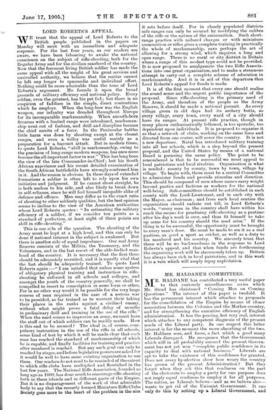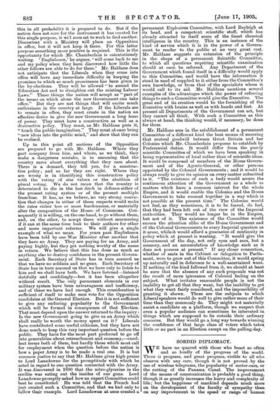MR. HALDANE'S COMMITTEES.
MR. HALDANE has contributed a very useful paper to that curiously miscellaneous series which Mr. Stead has christened " Coming Men on Coming Questions." The interest of this paper is twofold. It has the permanent interest which attaches to proposals for the consolidation of the Empire by means of closer association between the Colonies and the Mother-country, and for . strengthening the executive efficiency of English administration. It has the passing, but very real, interest which attaches to any competent diagnosis of the present needs of the Liberal party. In one respect this latter interest is for the moment the more absorbing of the two. Mr. Haldane sees, and faces, a fact which a good many Liberals disregard. He recognises that the Government which will in all 'probability succeed the present Govern- ment has not yet won " complete public confidence in its capacity to deal with national business." Liberals are apt to take the existence of this confidence for granted. Does not every by-election show how weary the country. has grown of the present Administration ? But they forget when they ask this that readiness on the part of the electorate to employ a party for one purpose does not imply equal readiness to employ it for all purposes. The nation, as Liberals believe—and as we believe also—: wants to get rid of the Unionist Government. It can only do this by setting up a Liberal Government, and this in all probability it is prepared to do. But if the nation does not care for the instrument it has created for this single purpose, it will soon set to work to find another. Discontent with a Ministry will place an Opposition in office, but it will not keep it there. For this latter purpose something more positive is required. This is the opportunity for which .Mr. Chamberlain is ostentatiously waiting. ' Englishmen,' he argues, ' will come back to me and my policy when they have discovered how little the other follows are able to do for them.' Mr. Haldane does not anticipate that the Liberals when they come into office will have any immediate difficulty in keeping the promises to which so much prominence has been given in the by-elections. They will be allowed " to amend the Education Act and to straighten out the existing Labour Laws." These things the nation will accept as " part of the terms on which alone the new Government can take office." But they are not things that will excite much enthusiasm in the country at large. If the Liberals are to remain in office, they must create in the nation an effective desire to give the new Government a long lease of power. They must have a constructive as well as a destructive policy. They must, as Mr. Haldane puts it, " touch the public imagination." They must at once bring " new ideas into the public mind," and show that they can be realised.
Up to this point all sections of the Opposition are prepared to go with Mr. Haldane. Where they part company from him, and where, as we think, they make a dangerous mistake, is in assuming that the country cares about everything that they care about. There is a demand, they tell you, for a construc- tive policy ; and so far they are right. Where they are wrong is in identifying this constructive policy with the rating of site values or the abolition of plural voting. We do not mean that the country is determined to die in the last ditch in defence either of the present rating system or of the present multiple franchise. It has, as we believe, no very strong convic- tion that changes in either of these respects would make the rates either loss or more burdensome, or materially alter the composition of the House of Commons. Con- sequently it is willing, on the one hand, to go without them, and, on the other, to accept them without murmuring if it can at the same time look to their authors for other and more important reforms. We will give a single example of what we mean. For years past Englishmen have been told by one War Minister after another that they have no Army. They are paying for an Army, and paying highly, but they get nothing worthy of the name in. return. We believe that this has done as much as anything else to destroy confidence in the present Govern- ment. Each Secretary of State has in turn assured us that we have no soldiers and no guns. Each Secretary of State has in turn assured us that we have only to listen to him and we shall have both. We have listened—listened dutifully and confidingly—but it has been altogether without result. The only permanent elements in our military system have been extravagance and inefficiency, and of these we have had enough. This consideration is sufficient of itself to make men vote for the Opposition candidates at the General Election. But it is not sufficient to give any enduring popularity to the Government which will be formed in consequence of that Election. That must depend upon the answer returned to the inquiry : Is the new Government going to give us an Army which shall really be worth the money spent on it ? Liberals have contributed some useful criticism, but they have not done much to keep this very important question before the public. They have for the most part preferred to go off into generalities about retrenchment and economy,—excel- lent terms both of them, but hardly those which most call for employment when the question before the nation is how a paper Army is to be made a real one. It is but common justice to say that Mr. Haldane gives high praise to Lord Lansdowne for the promptitude with which he acted in regard to one question connected with the Army. It was discovered in 1890 that the nitro-glycerine in the cordite was eating out the insides of our guns. Lord Lansdowne promptly asked how an expert Committee could best be constituted. He was told that the French had just created such a Committee, and that we had only to fellow their example. Lord Lansdowne at once created a permanent Explosives Committee, with Lord Rayleigh at its head, and a competent scientific staff; which has already attracted to itself some of the finest chemical intelligence in the country. This is an instance of the kind of service which it is in the power of a Govern- ment to render to the public at no very great cost. Mr. Haldane suggests an extension of the principle in the shape of a permanent Scientific Committee, to which all questions requiring scientific examination should at once be referred. Any Department of the Government which found itself in a difficulty would apply to this Committee, and would have the information it stood in need of supplied to it either from the Committee's own knowledge, or from that of the specialists whom it would. call to its aid. Mr. Haldane mentions several examples of the advantages which the power of referring things to such a Committee would give the Executive. The great end of its creation would. be the furnishing of the Executive with brains as well as with hands and feet. At present all Departments of the Government can act, but they cannot' all think. With such a Committee as this always at hand, the thinking would, if necessary, be done for them.
Mr. Haldane sees in the establishment of a permanent Committee of a different kind the best means of ensuring that mutual goodwill between Great Britain and her Colonies which Mr. Chamberlain proposes to establish by Preferential duties. It would differ from the purely scientific Committee of which we have been speaking in being representative of local rather than of scientific ideas. It would be composed of members of the Home Govern- ment and of the Agents-General, or other persons appointed by the Colonial Governments ; and it would be always ready to give its opinion on every matter submitted to it. "The existence of such a body would secure the continuous attention of the Government as a whole to matters which have a common interest for the whole Empire, and it would enable the Colonies and the Home Government to take counsel together in a way which is not possible at the present time." The Colonies would not feel, as they sometimes, it is to be feared, do feel, that they had been left out of the view of the Imperial authorities. They would no longer be in the Empire, but not of it. The existence of the Committee would ensure the attention alike of the Home Government and of the Colonial Governments to every Imperial question as it arose, while it would afford a guarantee of continuity in policy which at present is wanting. " It would give the Government of the day, not only eyes and ears, but a memory, and an accumulation of knowledge such as it does not possess at present." If any closer connection, whether of seats in the Cabinet or delegation to Parlia- ment, were to grow out of this Committee, it would spring up naturally and in deference to a well-ascertained want. If nothing of the kind followed from it, we should at least be sure that the absence of any such proposals was not the result of mere ignorance of Colonial feeling on the subject. What irritates reasonable people is not the inability to get all that they want, but the inability to get what they want fairly considered, and the impossibility of granting it shown. These are the subjects to which Liberal speakers would do well to give rather mere of their time than they commonly do. They might not materially assist a candidate on a platform, though we suspect that even a popular audience can sometimes be interested in. things which are supposed to lie outside their ordinary concerns. But they would go a long way towards winning. the confidence of that large class of voters which takes little or no part in an Election except on the polling-day.







































 Previous page
Previous page